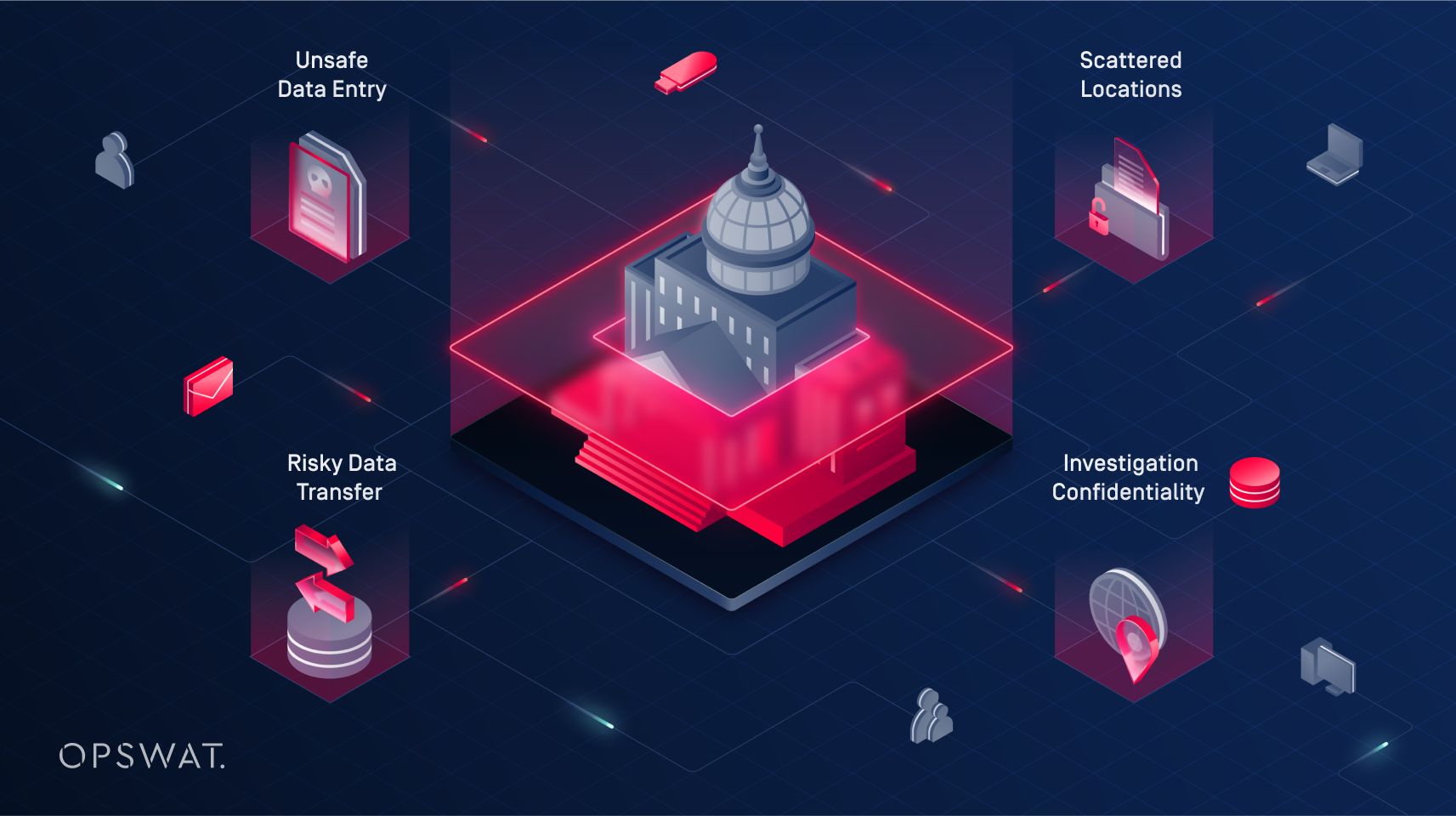Every day, law enforcement officers collect and extract critical evidence from various sources: USBs, laptops, and other digital devices holding the keys to investigations. Uncovering this data is just the beginning, as the next step involves moving the data securely across networks, reaching external vendors for testing. But with detectives spread across multiple locations, each working from their own workstation and laptop, every transfer adds the necessity of keeping this data confidential and secure. A single weak link in this chain could open the door to cyberthreats with immediate and severe consequences: leaked evidence, derailed investigations, and the risk of suspects evading justice.
Peripheral Media Risks in Law Enforcement
As essential and convenient as they are, peripheral and removable media are a prime target for cybercriminals. These devices may seem harmless, but they can cause significant damage - exposing users to malware and data exfiltration risks that could compromise an entire security infrastructure. The risks are amplified in law enforcement, where data is both highly sensitive and mission-critical, and daily operations depend on USB drives, laptops, and other devices.

Unsafe Data Entry
One of the highest risks comes from getting external data - evidence, lab results, other files - into the network. Every USB device or other external media can become an entry point for malware, and these devices must be secured without compromising the integrity of critical evidence.
Risky Data Transfer
Sensitive case data moves across networks daily - between workstations, labs, and outside vendors. However, data in transit can be intercepted or exposed, so securing data transfers is a constant concern, especially when it's handled via external USB devices.
Scattered Locations
With detectives operating from different locations, it’s becoming more and more complicated to maintain consistent security and manage devices effectively. Every endpoint needs to be secured and protected from unauthorized access or cyberthreats.
Investigation Confidentiality
The nature of law enforcement investigations requires a high level of confidentiality. If sensitive case details fall into the wrong hands, suspects walk free, evidence gets tainted, and justice is derailed, so law enforcement officers need to ensure their data remains untouched.
Additional Security Layers to Eliminate Peripheral Device-Borne Risks
To eliminate the risk of malicious files being introduced into their systems through USB drives, the client introduced OPSWAT’s MetaDefender Endpoint™ and MetaDefender Kiosk™ into their security infrastructure.

MetaDefender Endpoint
MetaDefender Endpoint protects devices inside critical IT/OT networks from peripheral and removable media threats.
This solution secures endpoints, by blocking all removable media usage until security conditions are met.
All devices are scanned with Metascan™ Multiscanning’s up to 30+ anti-malware engines and Deep CDR™ sanitization and regeneration to ensure files and data are safe from known, unknown, and AI-generated threats. Once the scanning is complete, and the device is considered safe, the user can proceed to access the files within.

MetaDefender Kiosk
The MetaDefender Kiosk is deployed at the headquarters, providing an additional layer of protection for peripheral media devices before they are introduced into the network.
The Kiosk uses the same proven, globally trusted, and award-winning technology as MetaDefender Endpoint to detect and block any potential malware or malicious files, ensuring that all peripheral media devices are clean before they are made accessible.
A single weak link in this chain could open the door to cyberthreats with immediate and severe consequences: leaked evidence, derailed investigations, and the risk of suspects evading justice. OPSWAT technology secured data transfers while ensuring uninterrupted workflows and compliance with data privacy regulations.
Secure Transfers, Uninterrupted Workflows, and Guaranteed Data Integrity
The client deployed MetaDefender Endpoint on detectives’ workstations and MetaDefender Kiosk at headquarters- ensuring every USB device is scanned, sanitized, and safe to use.
Deep CDR eliminates hidden threats that traditional security tools might miss, supporting over 180 file formats and recursively sanitizing multi-level nested archives.
Combined with 30+ leading AV engines in Metascan Multiscanning, they now detect nearly 100% of malware, blocking potential cyberthreats before they reach critical systems.
The risks of zero-day attacks are also mitigated, through OPWAT’s emulation-based sandbox, which dynamically analyzes file behavior in real time.
AI-powered data loss prevention automatically classifies and redacts sensitive information like PII, PHI, and PCI, helping the agency stay compliant with strict data privacy regulations.
The integration of MetaDefender Endpoint and Kiosk eliminates security blind spots, ensures seamless data transfers, and reinforces the integrity of our client’s investigations—without slowing down critical operations.
Mission-Critical Solutions for Mission-Critical Needs
Handling sensitive digital evidence while maintaining operational speed and security is a constant challenge for law enforcement. Our client needed a solution to safeguard their systems and data without disrupting critical workflows, so OPSWAT’s best-in-class solutions were the right fit.
With MetaDefender Endpoint and Kiosk together, the client has significantly reduced risks associated with peripheral media devices, ensuring the integrity of the investigations. Their approach is a strong example of how law enforcement agencies proactively protect their infrastructure from evolving risks.
To learn how OPSWAT can help secure your critical operations, contact an OPSWAT expert today.





